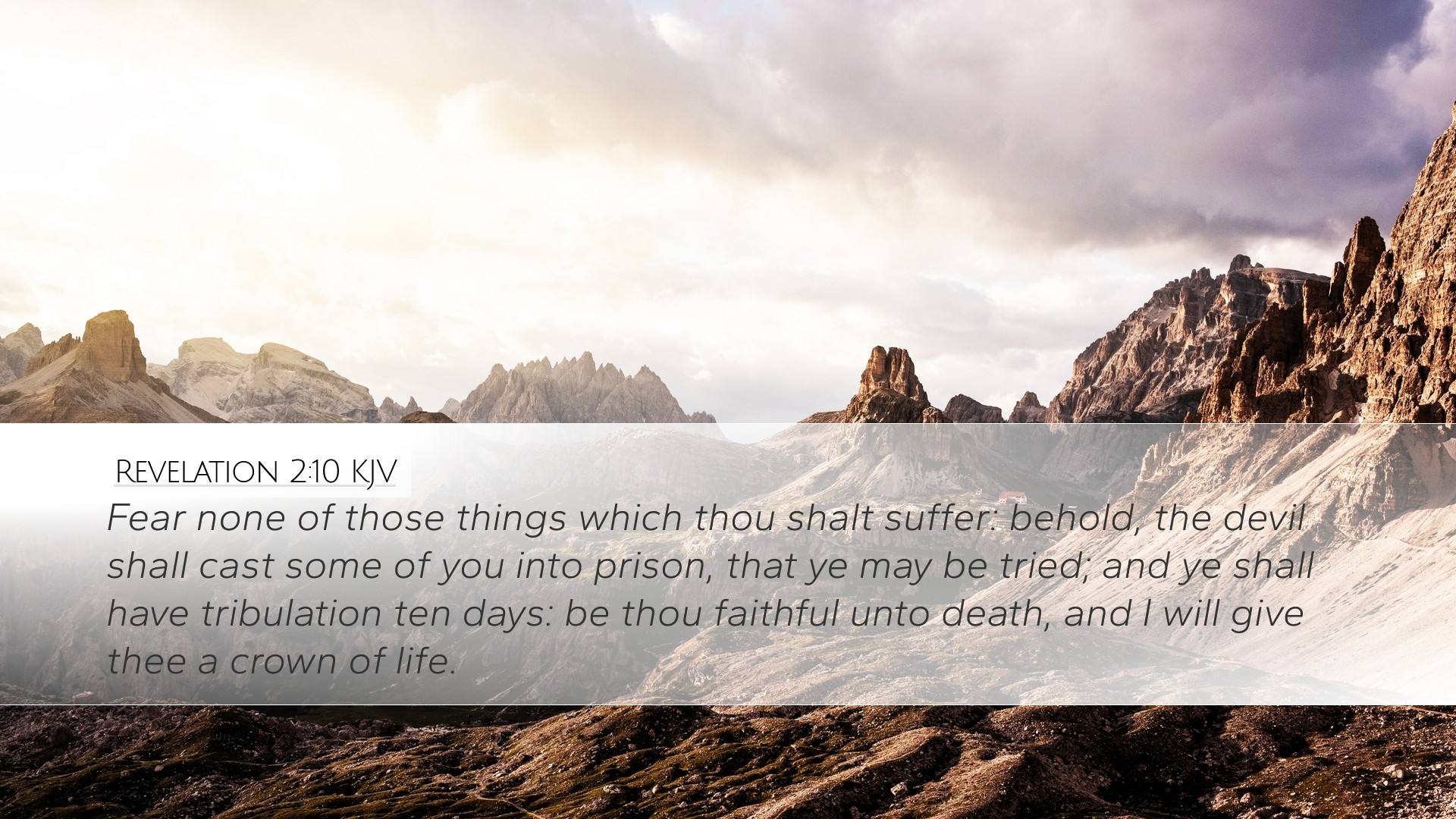Commentary on Revelation 2:10
Text of Revelation 2:10 (KJV): "Fear none of those things which thou shalt suffer: behold, the devil shall cast some of you into prison, that ye may be tried; and ye shall have tribulation ten days: be thou faithful unto death, and I will give thee a crown of life."
Introduction
The book of Revelation is a profound text filled with rich symbolism and dire warnings, intended to prepare the Church for the trials of faith they would encounter. Revelation 2:10 speaks directly to the persecuted church in Smyrna, addressing the reality of suffering and the promise of eternal life for those who remain faithful. This commentary aims to provide a comprehensive understanding of this verse, drawing insights from renowned public domain commentaries.
Historical Context
The early Christians, particularly in Smyrna, faced unprecedented persecution due to their faith. As detailed by authors like Matthew Henry, Smyrna was known for its fervent loyalty to Emperor worship and an aggressive stance against those who adhered to Christianity. Understanding the historical context is crucial in grasping the urgency and importance of Christ's message to the Church in Smyrna.
Persecution in Smyrna
Smyrna stands out in Revelation for being a city that worshiped the Roman Empire. According to Albert Barnes, the city was known for its fidelity to Rome and was prominent in the cult of emperor worship. Christians in this city were persecuted not only for their beliefs but also for their refusal to participate in idolatrous practices that were predominant at the time.
Exegesis of Revelation 2:10
- "Fear none of those things which thou shalt suffer:" The initial call not to fear underscores the importance of faith over fear in challenging times. Adam Clarke notes that fear can discourage the faithful and lead to compromise. Here, Christ encourages believers to trust in His sovereignty amid tribulations.
- "Behold, the devil shall cast some of you into prison:" This phrase highlights the role of satanic influence in persecution. Matthew Henry expounds that the devil’s direct involvement suggests a spiritual background to physical persecution. The imprisonment signifies a trial of faith, testing the endurance and integrity of believers.
- "That ye may be tried;" The testing of faith is part of the Christian journey. Reflecting upon this, Albert Barnes emphasizes that trials serve to refine faith, as gold is refined by fire. Such trials are vital for spiritual growth and maturity.
- "And ye shall have tribulation ten days:" The reference to "ten days" has sparked various interpretations. While some see this as a literal timeframe, others consider it symbolic of a complete but limited period of suffering. Adam Clarke points out that the use of days emphasizes the temporal nature of worldly suffering compared to eternal glories.
- "Be thou faithful unto death:" Here, Christ calls for steadfastness in faith, even to the point of death. Matthew Henry provides insight on this pivotal exhortation, linking faithfulness with ultimate victory and divine acknowledgment.
- "And I will give thee a crown of life." The assurance of divine reward is a powerful motivator. Albert Barnes explains that the 'crown of life' symbolizes not only eternal life but also honor and glory bestowed upon those who endure trials with faith.
Theological Implications
This passage carries significant theological implications for believers today. It reinforces several key doctrines that are fundamental to Christian belief:
- The reality of suffering: Faith does not exempt Christians from suffering; rather, it often subjects them to trials. The call to acknowledge suffering as part of the Christian experience is vital.
- The necessity of endurance: Faithfulness in adversity is a recurring theme in Scripture. It speaks to the concept of perseverance in faith, resonating with passages like James 1:12, which promises a crown of life to those who endure trials.
- The hope of reward: The promise of the crown of life emphasizes that earthly sufferings are transient. The eternal perspective should motivate believers to endure hardships for the sake of Christ.
Application for Modern Believers
As we reflect on Revelation 2:10, several applications emerge for contemporary Christians:
- Embrace suffering with courage: Believers should prepare mentally and spiritually for persecution and hardship, understanding that such experiences are part of living out their faith.
- Encourage one another: The community of believers should support each other in trials, fostering a culture of strength and resilience that reflects Christ’s love.
- Focus on the promised reward: The eternal promise should shift believers’ perspectives from earthly concerns to higher spiritual realities, fostering hope in the midst of despair.
Conclusion
Revelation 2:10 serves as a profound reminder of the challenges faced by the early Church and the eternal rewards awaiting those faithful to the end. Drawing insights from the commentaries of Matthew Henry, Albert Barnes, and Adam Clarke enriches our understanding of this powerful verse. It encourages modern believers to confront adversity with faith, grounded in the knowledge of God's promises. As such, this passage remains a beacon of hope and an exhortation to endurance for all who profess the Christian faith.


